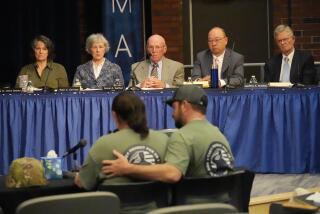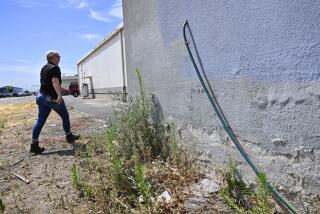Army says failures in leadership at biodefense lab led to mishandled anthrax shipments
Reporting from Washington — Mismanagement and technical failures allowed an Army biodefense facility to mistakenly send live anthrax samples to 194 commercial, academic and federal facilities over more than a decade, the Army said Friday after concluding an internal investigation.
The Army’s Dugway Proving Ground in Utah sent sealed vials containing live anthrax spores to companies and laboratories in all 50 states and nine other countries in what investigators called a systemic lapse in the military’s program to study and build defenses against biological weapons agents.
Brig. Gen. William E. King, commander of the biodefense lab at Dugway from 2009 to 2011, and 11 others who worked at the lab should be held accountable for failures in leadership and oversight, the report concludes.
King “repeatedly deflected blame” and created a “complacent atmosphere resulting in an organization plagued by mistakes and unable to identify systemic issues in the high-risk, zero-defects world of biological select agents and toxins,” the report says.
King was promoted to brigadier general in February and left Dugway. He is now commander of the 20th Chemical, Biological, Radiological, Nuclear, Explosives Command at Aberdeen Proving Ground in Maryland.
King did not respond to a message left at Aberdeen. The names of the 11 others were redacted in the report.
See more of our top stories on Facebook >>
“We saw failures to take action,” said Maj. Gen. Paul A. Ostrowski, author of the 157-page Army report, at a Pentagon news conference Friday.
“We saw best practices by lab technicians not being used,” he said. “And so the intent is to ensure that the secretary of the Army and the leadership of the Army has an opportunity to adjudicate that.”
Ostrowski and 10 investigators interviewed 69 witnesses and reviewed records of how the infectious material was mishandled.
The dangerous shipments were first discovered in May when a commercial lab in Maryland found live spores in vials sent from Dugway.
Investigators found that Dugway had sent infectious material from 2004 to 2015 via FedEx and other commercial shipping companies. Each vial contained 1 milliliter -- about one-fifth of a teaspoon -- of liquid anthrax.
No one got sick but 31 military and civilian lab workers were treated with antibiotics and observed for potential exposure.
U.S. military research labs grow or store anthrax spores to study its characteristics in an effort to protect U.S. troops from enemy use of biological weapons. The U.S. gave up its offensive biological weapons program in the 1970s.
Bacillus anthracis causes an acute disease that can be fatal if not treated. It is not contagious but can be inhaled, ingested or transmitted through contact on the skin. Someone who is infected may not show symptoms for weeks.
Scientists at Dugway were supposed to use gamma radiation to render the anthrax inactive, and then place the sample in an incubator for 10 days to ensure the spores did not multiply.
At that point, each sample is given a “death certificate” and frozen.
But the process failed to render the spores safe, the report said.
Ostrowski said the Army must find more reliable ways to handle anthrax.
“That’s our intent, to ensure that what happened in this event doesn’t happen again,” he said.
Follow @wjhenn for military and defense info.
ALSO
Obama temporarily bans new coal leases on federal land
Helicopters carrying 12 Marines collide off Oahu; no word on survivors
Supreme Court to decide corruption case of former Virginia Gov. Bob McDonnell
More to Read
Sign up for Essential California
The most important California stories and recommendations in your inbox every morning.
You may occasionally receive promotional content from the Los Angeles Times.











